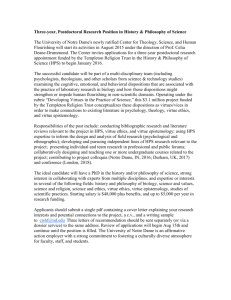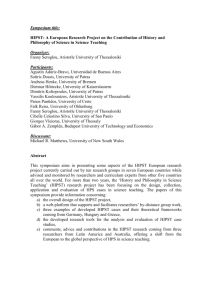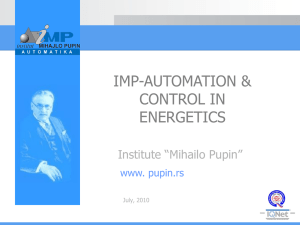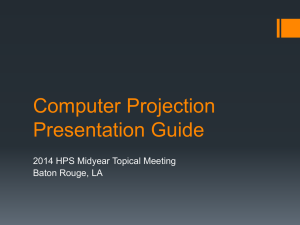Fall_2015
advertisement
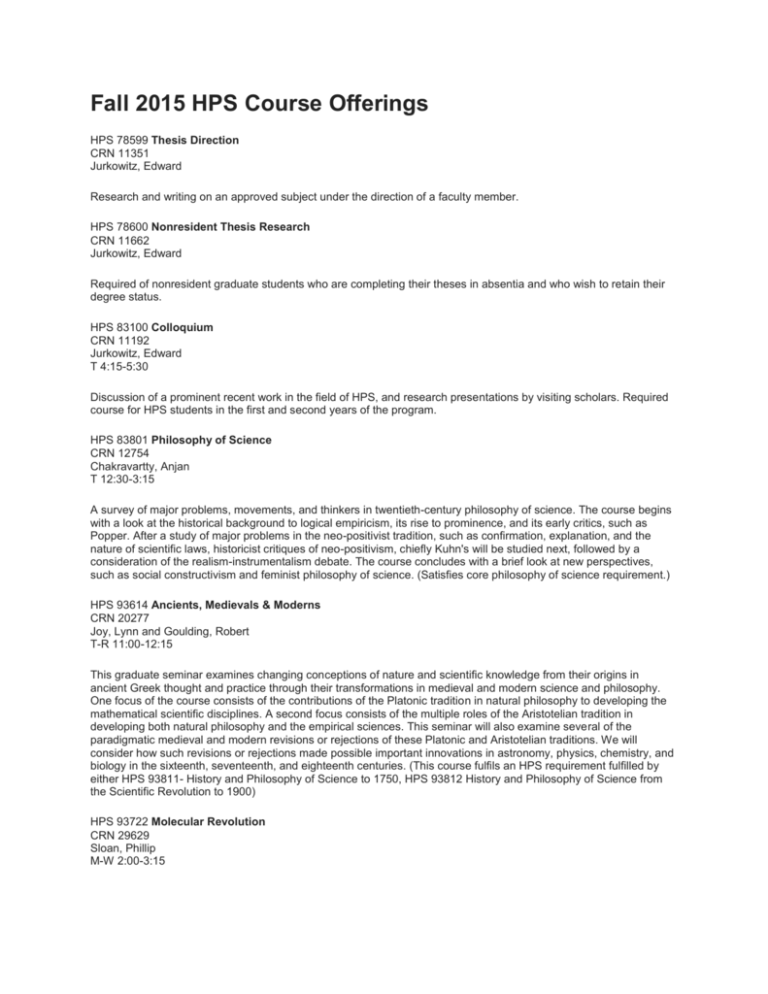
Fall 2015 HPS Course Offerings HPS 78599 Thesis Direction CRN 11351 Jurkowitz, Edward Research and writing on an approved subject under the direction of a faculty member. HPS 78600 Nonresident Thesis Research CRN 11662 Jurkowitz, Edward Required of nonresident graduate students who are completing their theses in absentia and who wish to retain their degree status. HPS 83100 Colloquium CRN 11192 Jurkowitz, Edward T 4:15-5:30 Discussion of a prominent recent work in the field of HPS, and research presentations by visiting scholars. Required course for HPS students in the first and second years of the program. HPS 83801 Philosophy of Science CRN 12754 Chakravartty, Anjan T 12:30-3:15 A survey of major problems, movements, and thinkers in twentieth-century philosophy of science. The course begins with a look at the historical background to logical empiricism, its rise to prominence, and its early critics, such as Popper. After a study of major problems in the neo-positivist tradition, such as confirmation, explanation, and the nature of scientific laws, historicist critiques of neo-positivism, chiefly Kuhn's will be studied next, followed by a consideration of the realism-instrumentalism debate. The course concludes with a brief look at new perspectives, such as social constructivism and feminist philosophy of science. (Satisfies core philosophy of science requirement.) HPS 93614 Ancients, Medievals & Moderns CRN 20277 Joy, Lynn and Goulding, Robert T-R 11:00-12:15 This graduate seminar examines changing conceptions of nature and scientific knowledge from their origins in ancient Greek thought and practice through their transformations in medieval and modern science and philosophy. One focus of the course consists of the contributions of the Platonic tradition in natural philosophy to developing the mathematical scientific disciplines. A second focus consists of the multiple roles of the Aristotelian tradition in developing both natural philosophy and the empirical sciences. This seminar will also examine several of the paradigmatic medieval and modern revisions or rejections of these Platonic and Aristotelian traditions. We will consider how such revisions or rejections made possible important innovations in astronomy, physics, chemistry, and biology in the sixteenth, seventeenth, and eighteenth centuries. (This course fulfils an HPS requirement fulfilled by either HPS 93811- History and Philosophy of Science to 1750, HPS 93812 History and Philosophy of Science from the Scientific Revolution to 1900) HPS 93722 Molecular Revolution CRN 29629 Sloan, Phillip M-W 2:00-3:15 This course is intended for students in both science and arts and letters interested in gaining historical and philosophical perspective on modern developments in the functional life sciences (embryology and human development, genetics, cell theory, general physiology, biophysics, and molecular biology). The course will commence with Kant’s reflections on biology and organism and will follow the intellectual and institutional developments of selective episodes in the science of life in German, French, and English traditions from the nineteenth century into the twenty first. Included will be a small laboratory component and visits to research facilities. Authors under examination will include Claude Bernard, Karl Ernst von Baer, Gregor Mendel, Hermann von Helmholtz, Jacques Loeb, Erwin Schrödinger, Max Delbrück, Watson and Crick, Jacob and Monod, and contemporary commentators on genetics, biophysics, developmental biology, and reductionism. Open to advanced undergraduates by permission. Graduate students outside HPS may register as auditors. Satisfies core HPS history requirement. HPS 98742 History of Economic Thought CRN 20630 Mirowski, Philip T-R 2:00-3:15 The course intends to ask how it is that we have arrived at this curious configuration of doctrines now called "economics"; and importantly, how differing modes of historical discourse tend to ratify us in our prejudices about our own possible involvement in this project. The course will begin in the 18th century with the rise of a self-conscious discipline, and take us through the stabilization of the modern orthodoxy of WWII. Effort will be made to discuss the shifting relationship of economics to the other sciences, natural and social. A basic knowledge of economics (including introductory economics and preferably intermediate economics) will be presumed. HPS 93875 Philosophical Issues Concerning Time CRN 20631 Sieroka, Norman M-W 5:05-6:20 Time is a fundamental dimension in our encounter with the world and it prominently figures in various areas of philosophy. This course provides an introduction to philosophical issues surrounding the concept of time in the following contexts. We will treat metaphysical questions concerning the relation between time and change, and the existence of past, present, and future; issues in philosophy of physics regarding the measurement of time, absolute versus relative time, the direction of time, and the possibility of time travel; issues in the philosophy of cognitive science arising from the constitution and fundamental role of time consciousness and its possible neurophysiological counterparts; normative and ethical issues connected with the role played by temporal relations for the conduct of our lives, for the responsibility with regard to other generations, and in the context of punishing crimes. Finally, we will have a brief look at the handling of time within history and philosophy of science itself: that is, as it is used in identifying and resolving problems and questions about the historiography of the sciences and the use of history for philosophy and science.

